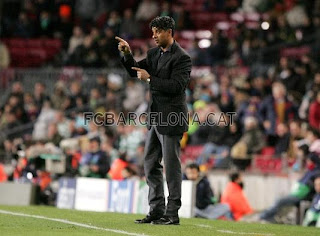 Origins (1899-1922)
Origins (1899-1922) Businessman Hans Gamper, born in Winterthur on 22 November 1877, was the man who decided to start a football club in Barcelona, by putting a note in a local sports magazine on 22nd October 1899, calling for players.
Gamper, known in Barcelona as Joan, had moved to the Catalan capital in 1898 for business reasons and just over a month after placing his ad, on 29th November 1899 he preside over the first club meting at the Gimnas Sole. Together with Gamper, Gualteri Wild, Lluís d'Ossó, Bartomeu Terradas, Otto Kunzle, Otto Maier, Enric Ducal, Pere Cabot, Carles Pujol, Josep Llobet, John Parsons and William Parsons attended that historic gathering. The meeting established the club and Englishman Gualteri Wild became the first President, combining his executive duties with his playing skills, since Wild, like the rest of the founders, was first and foremost a player.
 The first kit
The first kit
From the start, the players wore the famous blue and claret colours, half the shirt one colour and half the other with the sleeves the opposite colour and white shorts.
The first club coat of arms
At the beginning of its history the club shared the citys coat of arms, as a demonstration of its commitment to the city. Later, in 1910 the board decided that the club needed its own coat of arms and organized a competition to find the best design which was won by an anonymous member who produced the present model.
 The first game
The first game
In their first ever match, Barca played a team made up of English expatriates in Bonanova (now known as Turo Park). The English team, which actually included a number of Barca players, won 1-0.
The first grounds
Barca's early search for a permanent home saw them playing at the Hotel Casanovas (1900), la carretera d'Horta (1901), el carrer Muntaner (1905) and carrer Indústria, which was the first ground owned by the club and had a capacity of 6,000 with a two tier stand, unique for its time.
 The ground was officially opened on 14th March 19 1909, by which time the club had already begun to collect titles, having won the Copa Macaya in 1901-02 and the Catalan Championships of 1904-05 and 1908-09. Spurred on by their new surroundings, the club went on to win the Catalan Championships of 1909-10, 1910-11, 1912-13, 1915-16, 1918-19 1919-20, 1920-21 and 1921-22, and the Spanish Championships of 1909-10, 1911-12, 1912-13, 1919-20 and 1921-22, as they enjoyed their first big period of sporting and social expansion.
The ground was officially opened on 14th March 19 1909, by which time the club had already begun to collect titles, having won the Copa Macaya in 1901-02 and the Catalan Championships of 1904-05 and 1908-09. Spurred on by their new surroundings, the club went on to win the Catalan Championships of 1909-10, 1910-11, 1912-13, 1915-16, 1918-19 1919-20, 1920-21 and 1921-22, and the Spanish Championships of 1909-10, 1911-12, 1912-13, 1919-20 and 1921-22, as they enjoyed their first big period of sporting and social expansion.
Founder, Joan Gamper
Born on the 22nd November 1877 in Winterthur, Switzerland, the young Hans Gamper was interested in following sports. He was already a keen on athletics, cycling and football and above all, had already founded FC Zurich. He arrived in Barcelona aged 20 and began mixing with others interested in sports; he began raising money for the foundation of Barça, with the principle interest in practising sport. He was a good player and in 1901 he scored 49 of the 88 goals scored by the team.
 He was a player up until 1903 and in 1908 became president of the club for the first time in order to save the club from disappearing. Joan Gamper was to become president a total of five times in his time up until 1925. Gamper became fully integrated into Catalonia; both speaking and writing in Catalan. In 1925 he suffered the repression of the dictator of Primo de Rivera due to the dictator’s preference to Real Madrid. In 1930, Gamper again suffered a setback with his business and finally ended up committing suicide.
He was a player up until 1903 and in 1908 became president of the club for the first time in order to save the club from disappearing. Joan Gamper was to become president a total of five times in his time up until 1925. Gamper became fully integrated into Catalonia; both speaking and writing in Catalan. In 1925 he suffered the repression of the dictator of Primo de Rivera due to the dictator’s preference to Real Madrid. In 1930, Gamper again suffered a setback with his business and finally ended up committing suicide.


































